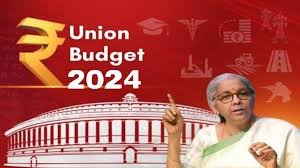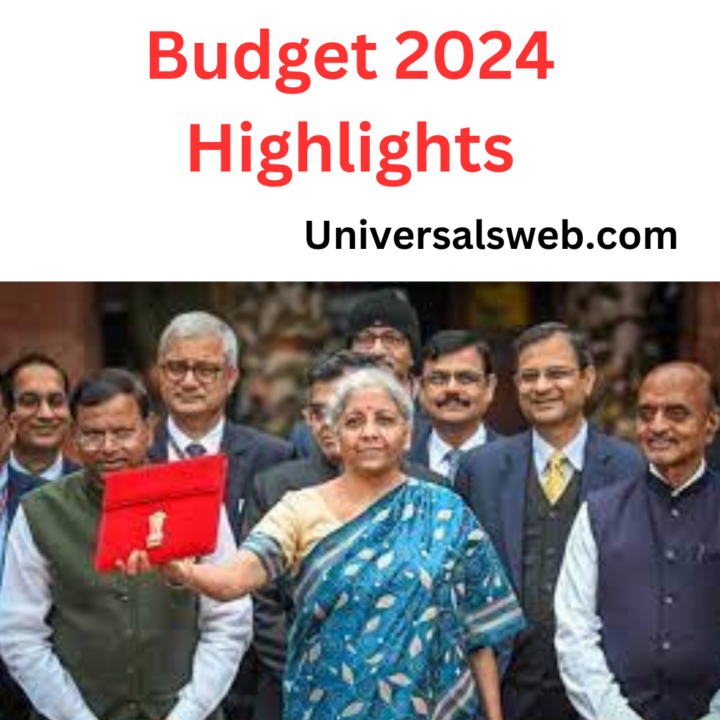Union Finance Minister Nirmala Sitharaman presented the interim Union Budget 2024 on February 1,During the Union Budget 2024-25 announcement, Finance Minister Nirmala Sitharaman confirmed the continuity of existing tax rates, encompassing direct, indirect taxes, and export duties. She unveiled an 11% increase in the upcoming year’s capital expenditure, reaching ₹11.1 lakh crore. Additionally, Sitharaman revised the fiscal deficit to 5.8% of the gross domestic product.
In a move to support the deserving middle class, particularly those residing in rented houses, slums, chawls, or unauthorized colonies, the Finance Minister introduced a housing scheme. Prime Minister Modi expressed that this initiative aimed to facilitate their journey towards acquiring or constructing their own homes.
Amid various announcements benefiting the youth, impoverished, women, and farmers, Sitharaman emphasized the extension of Ayushman Bharat healthcare coverage to all ASHA and Anganwadi workers and helpers.

2024-25 Interim Budget Highlights
- The government has withdrawn income tax demands up to ₹25,000 (until 2009-10) and ₹10,000 from 2010-11 to 2014-15, benefiting approximately one crore taxpayers.
- A scheme will be launched to assist the middle class living in rented houses in buying or building their own homes.
- No changes have been made in direct and indirect tax rates.
- Nominal GDP growth for FY25 is projected at 10.5%
- The projected fiscal deficit for FY25 is 5.1%, lower than the revised estimate of 5.8% in FY24.
- Capital expenditure has been increased by 11% to ₹11.11-lakh crore.
- The disinvestment target from central public sector enterprises (CPSEs) is set at ₹50,000 crore for FY25, up from ₹30,000 crore in FY24.
- Tax benefits for start-ups and investments made by sovereign wealth or pension funds have been extended by one year until March 31, 2025.
- The government plans to borrow ₹14.13-lakh crore in the next fiscal year, a decrease from ₹15.43 lakh crore in FY24.
- The gross tax revenue target for FY25 has been increased by 11.46% to ₹38.31-lakh crore, compared to ₹34.37 lakh crore in FY24.
- The target for direct tax collection is set at ₹21.99-lakh crore, while the target for indirect tax is ₹16.22-lakh crore.
- The government is set to establish a high-powered panel to address challenges related to population growth and demographic changes.
- The government will release a white paper on the mismanagement of the economy prior to 2014.
What is Interim Budget ?
An Interim Budget is a financial plan presented by a country’s government for a brief duration, often a few months. It aims to address immediate financial needs and expenditures in situations where a comprehensive budget for the entire fiscal year cannot be presented. This budget functions as a provisional financial arrangement until a new government is formed or until the presentation of the regular budget.
In the Indian context, an Interim Budget is typically unveiled in an election year when general elections are scheduled, and a change in government might occur. The outgoing government introduces an Interim Budget to ensure the uninterrupted functioning of government operations and spending until the new government assumes office and presents a complete budget.
The Interim Budget outlines estimates of government revenue and expenditures for the short interim period. It generally avoids introducing significant policy changes or new initiatives, reserving those for inclusion in a regular budget.
It is crucial to recognize that an Interim Budget differs from a regular or full budget, which spans the entire fiscal year and is presented by the government in the absence of an imminent change in leadership.
How is stock market affected by Budget?
The stock market can experience notable fluctuations in response to the unveiling of a national budget. The impact is diverse, contingent on the specific measures and policies articulated in the budget. Here are several ways in which the stock market can be influenced by a budget:
Sectoral Dynamics: Different economic sectors may undergo distinct effects based on the policies introduced in the budget. If the budget entails favorable incentives for a particular industry, stocks within that sector may witness positive movement.
Taxation Adjustments: Alterations in tax policies, including corporate tax rates, capital gains tax, or dividend tax, can directly affect corporate profitability and subsequently impact stock prices. Investors keenly observe any changes in tax regulations that may impact their returns.
Infrastructure Allocations: Budgets often earmark funds for infrastructure spending. Stocks of companies involved in construction, materials, or infrastructure development may experience a positive impact if the budget allocates significant funds to these areas.
Interest Rate Influence: Budgetary measures that affect interest rates can have repercussions on the stock market. For instance, if the budget hints at changes in monetary policy or borrowing rates, it can influence the cost of capital for businesses, impacting their valuations.
Government Debt Considerations: Investors closely monitor how the government plans to manage its fiscal deficit and debt levels. Elevated levels of government borrowing may raise concerns about inflation and interest rates, potentially influencing stock prices.
Consumer Spending Impact: Policies pertaining to individual taxation, subsidies, or social welfare programs can impact consumer spending, affecting companies in industries such as retail, consumer goods, and services.
Global Factors Influence: The global economic context can influence the stock market in response to budgetary measures. International investors may reassess their portfolios based on how a country’s budget affects its economic prospects and competitiveness.
Market Sentiment: Investor sentiment can be swayed by the overall tone of the budget speech, perceived government stability, and the clarity of economic policies. Positive sentiments may lead to increased buying activity, while uncertainty can result in market volatility.
It’s noteworthy that the market’s reaction can be immediate but may evolve over time as investors scrutinize the budget in greater detail. Additionally, market movements are influenced by a blend of domestic and global factors. Traders and investors closely track budget announcements to make informed decisions about their portfolios.


2 thoughts on “Budget 2024 Highlights: No changes in direct, indirect tax rates, The projected GDP growth for FY25 stands at 10.5%.”